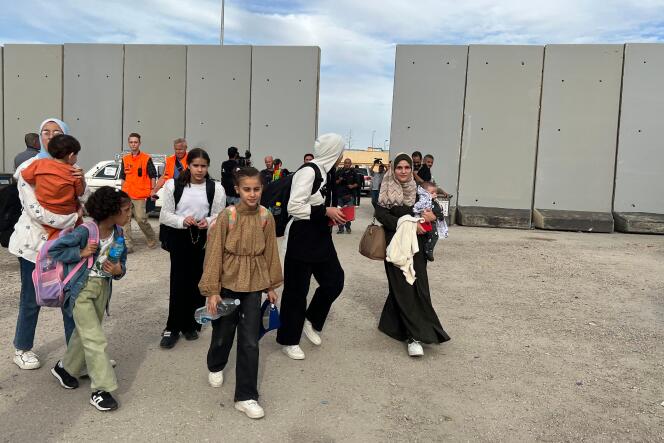


As she set foot in Egypt on Wednesday, November 22, Fatima Ashour could not suppress a sob. They were neither tears of joy nor of deliverance. They were a mixture of exhaustion, dismay and anger. "I had to leave my family, friends and colleagues behind. They're forcing us to give up everything," lamented Ashour, a Palestinian lawyer. Since October 7, she has been moved in stages from Gaza City to the south of the enclave, as the bombardments have taken their toll. "We were surrounded by death. There is no shelter. Even the schools are targeted," she said, indignantly. Four days earlier, a neighboring house in Khan Yunis was blown up by a bomb. "We were woken up by shards of glass from the windows exploding over our heads," she recalled, her eyes haggard.
On Wednesday, her name was on the list of people authorized to leave the Gaza Strip. At dawn, she went to the Rafah terminal, on the Palestinian side. It was 3:30 pm when Ashour was able to cross the border. A bag hangs over her shoulder; she hastily packed only a few belongings and her computer. In her left hand, she firmly held her Egyptian passport, a "piece of paper," she said, thanks to which she was able to cross the border, a privilege that her relatives did not have.
At the Rafah crossing, the only way out of Gaza, only foreign passport holders, dual nationals and a few hand-picked Egyptians are allowed to enter Egypt. Since October 21, 7,730 foreign nationals and 1,100 Egyptians have been evacuated. On Wednesday afternoon, families arrived in bunches. A grandmother passed by in a wheelchair. Behind her, the grandchildren, schoolbags on their backs, holding hands. The father followed, his head tucked into his shoulders. The faces were tired. A few Egyptians formed welcoming committees. The reunions were warm, but not much more. Everyone here was in shock. Few words were exchanged as the suitcases were hoisted onto the roof of a minibus.
Faris, 51, scanned the gate without blinking, on the lookout for the slightest familiar face crossing the border. Ten members of his family, who left on the eve of the war to celebrate a wedding in Gaza, were due to arrive today. "It's like a trap closing in on them. My heart has stopped beating. This dirty war must end," he murmured, raising a wary eye to the sky, where an Israeli reconnaissance drone was buzzing.
The four-day truce announced the day before by Israel and Hamas, to allow an exchange of civilian prisoners and the intensification of humanitarian aid, had not yet begun. In addition to the drone's roar, a sudden explosion recalled the nearby war. "Make no mistake, these four days of truce are just to get the hostages out, it won't change the fate of thousands of other civilians. The Israelis have made it very clear that they are going to continue the war," said Ashour, before turning to leave.
You have 65% of this article left to read. The rest is for subscribers only.
